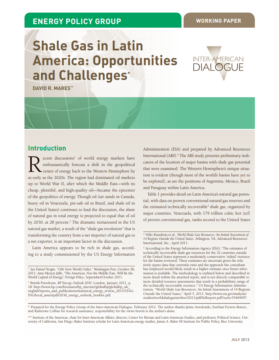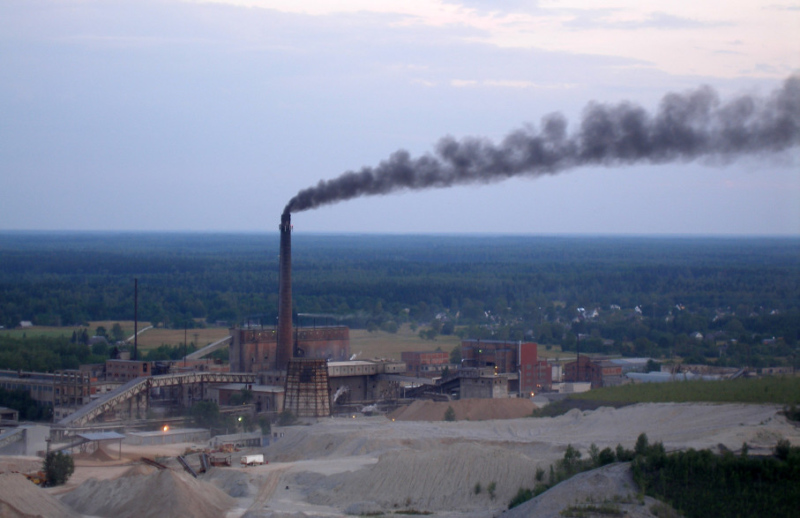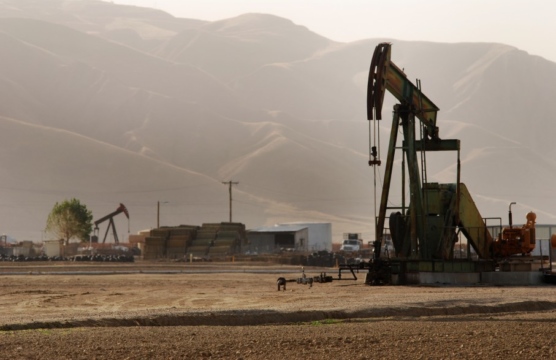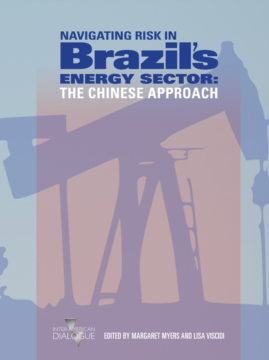
Shale Gas in Latin America
Unless resource nationalism can be made compatible with providing incentives for significant foreign participation, it may be too early to start trumpeting a bonanza for Latin America.
A boom in the production of shale gas and other unconventional energy sources has prompted a rethinking of energy policy in countries throughout the hemisphere and the world. A special session at the Inter-American Dialogue explored the implications of the so-called shale gas revolution for Latin America. Professor David Mares from the University of California, San Diego and Rice University’s Baker Institute for Public Policy reviewed the findings of his recent working paper, “Shale Gas in Latin America” (download below). Commentary was also provided by Edward Morse, Citigroup’s Global Head of Commodities Research.
If developed prudently, shale gas could significantly improve Latin American countries’ economic prospects and energy security. Reserves are particularly significant in Argentina and Mexico, which possess some of the largest endowments of technically recoverable shale gas in the world. Morse noted that untapped potential in these and other countries will attract attention and investment by major U.S. energy companies.
Morse also discussed the benefits of shale gas relative to many conventional sources. Shale gas wells can be brought into production quickly, making them less vulnerable to sudden shifts in government attitudes than slower-developing unconventional energy sources like deep-water drilling. Gas could reduce overall impact on the environment by crowding out dirtier fuels such as coal and oil.
Many of these benefits are already apparent in the United States and Canada, where the shale gas revolution is well under way in areas like Pennsylvania, Texas and Quebec. A surge in gas production has transformed U.S. energy markets, driving the ratio between gas prices and oil prices to unprecedented levels.
Yet Latin America faces major challenges to extracting its vast deposits of shale gas. Mares stressed the challenges of geology, geography and politics for the region, noting that shale resources are not homogenous and some are much easier to extract than others. Even when reserves are technically and commercially recoverable, a remote location can dramatically increase the costs of extraction. Such is the case of Chile, which possesses significant reserves distant part of country far removed from existing natural gas and mineral extraction infrastructure.
Both speakers also emphasized the importance of political factors. The United States has benefited highly developed capital markets, private rights to subsoil resources, and a diffuse and flexible regulatory regime. In contrast, highly centralized regulatory frameworks and a strong political tradition of resource nationalism have made private experimentation and entrepreneurship more difficult in most Latin American states.
Moreover, frequent government intervention in macroeconomic policy and have reduced the returns to capital in much of the region. Heavy restrictions on capital movement and prices, arbitrary modifications to contracts and tax regimes, and obstacles to financing have suppressed investment in countries including Argentina and Brazil. A high degree of uncertainty and a lack of confidence in local governments have also made major international players hesitate to invest in these areas.
These challenges notwithstanding, Mares and Morse asserted that Latin America will attract significant investment, even if not immediately. Morse predicted that the reserves are just too tempting in many places to be passed over. Companies will take the risks where necessary and wait out better regulatory regimes. Those countries that are currently accommodating, like Colombia, will receive major investment now.
Mares agreed, though cautioning that political change may be slow to come in nations like Argentina. Deeply entrenched resource nationalism and complex political dynamics mean that any transformation is likely to be an incremental one. He also stressed the importance of winning over political “veto players,” without whose participation any dramatic expansion of shale gas production will be impossible.
Unless resource nationalism can be made compatible with providing incentives for significant foreign participation, it may be too early to start trumpeting a bonanza for Latin America.
Think-tank Inter-American Dialogue recently held a closed-door event which brought together Colombia’s new mines and energy minister, Tomás González, with CEOs, industry association heads and regulators.
In the first of a two-part series, Inter-American Dialogue’s energy, climate change and extractive industries program director Lisa Viscidi talks to BNamericas about how the Colombian government is looking to increase oil reserves and maintain competitiveness as Mexico opens its hydrocarbons market.
Brazil’s oil and gas and electricity sectors are an important destination for Chinese direct investment.


